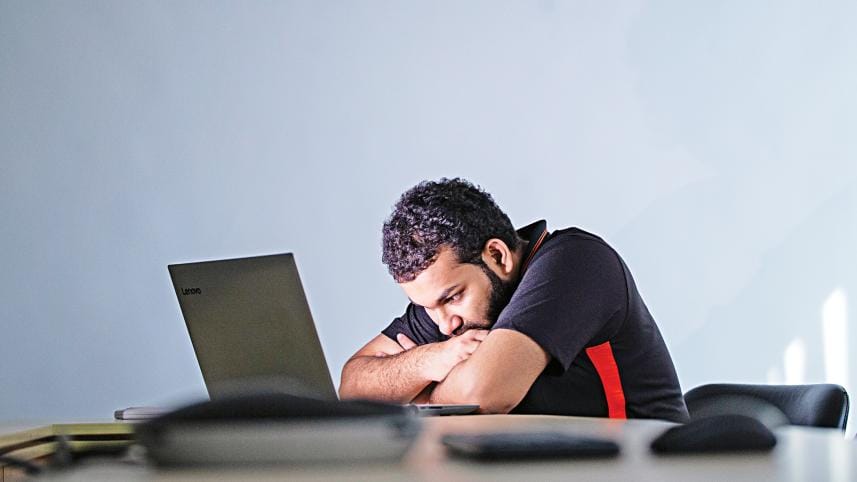The Bangladesh edtech market: Where is it going?

Edtech (education technology) has come a long way since its inception. In Bangladesh, the landscape has continued to evolve, with more and more players entering the market with every passing year.
Globally, the trend is on a whole other level, with reliable sources like Statista, a data company specialising in market and consumer statistics, estimating the global edtech industry to be worth US $254.8 billion in 2021, with it predicted to reach US $605.4 billion by 2027. Similarly, the New York-based HolonIQ, a global impact intelligence platform for innovative edtech companies, predicts the global edtech industry to be worth at least US $10 trillion by 2030, driven in part by the population growth in emerging countries in Asia and Africa.
HolonIQ, in 2022, also valued India's BYJU's as the number one edtech platform globally at US $22 billion. The two other companies in the top three were from China that year.
The Asian edtech market has been thriving for some time now and one major reason seems to be their population. With India and China being two of the most populated countries in the world, it has allowed edtech companies there to leverage this population for their own bottom lines.
As such, this makes a great case for why the edtech industry in Bangladesh has a lot of prospect and promise going forward.
If we are to observe the Bangladeshi edtech market, the major players that immediately emerge are 10 Minute School (10MS), Shikho, Interactive Cares, and EduHive, to name a few.
Out of them, the definite top two are 10MS and Shikho, who have in large part dominated the market in terms of bringing in users and raising capital. Interestingly, both 10MS and Shikho are primarily focused on the K-12 — from Kindergarten to grade 12 — segment. While both have also introduced courses beyond this segment, it still continues to serve as their bread and butter.
The strategy is a solid one, as a 2014 report from the Bangladesh Bureau of Educational Information and Statistics showed that one-third of total education expenditures of households in Bangladesh is spent on coaching centers and house tutors. Since then, numerous edtech companies have popped up and tried to become an alternative to traditional coaching centres and home tutors.
As a result of the two most dominant edtech players having a stronghold on this segment in the market, newer players are devising other strategies to capture a portion of the edtech market in Bangladesh.
Keeron is one such new player to the market, having started their operations in mid-2023. Sitting down with Arafat Hossain, Head of Marketing at Keeron, the first question I asked him was how they were differentiating themselves from 10MS and Shikho.
"Keeron differentiates itself by focusing on community based learning from the top 1% of the industries. Though it offers recorded courses, throughout the year it keeps communicating with its learners in the form of workshops and career summits. And its live courses are designed to serve the benefits of community learning," he explained.

Asked what kind of growth Keeron is experiencing as a result of their strategies, Hossain said, "Keeron is on a strong growth trajectory, having seen increasing user engagement and partnerships with universities. The company has expanded its user base by focusing on high-quality, interactive content and an intuitive learning experience. In the next five years, Keeron aims to become a leading edtech platform in Bangladesh, serving over 10 million active users. The goal is to become a one-stop solution for learners, educators, and institutions, facilitating an integrated ecosystem."
The transition from HSC and O-level to university and beyond often can be a challenge for many, particularly in terms of soft skills. Platforms like Keeron can help those students bridge that gap, whether it be academically during their university years or professionally when they are working full-time jobs.
Speaking about the boom of edtech and its current state in Bangladesh, Azmine Adel Al Aziz, an expert from the edtech arena, said, "Bangladesh currently has over 300+ edtech companies. The boom happened during the Covid-19 period, when people were unable to physically attend school or universities. Additionally, there is this 'coaching culture' in our country, where people go to school, but also to coachings and many feel that when they are not going to coaching, they are not actually learning. As a result, edtech boomed during the pandemic. However, after things returned to normal, consumer habits also shifted back to the status quo. The growth journey for edtech began to decline, as it seems people in Bangladesh still prefer an offline class to an online one."
Indeed the edtech industry flourished while numerous others declined during the Covid-19 pandemic.
In fact, in 2022 alone, Bangladeshi edtech startups raised around US $6 million in funding, a milestone at that time. However, there has been a slight shift in the investment landscape.
According to Azmine, venture capitalists and investors have slightly changed what they look for when funding such startups.
"There are two schools of thought when it comes to funding. Pre-Covid funding was mainly backed by large venture capitalist firms. At that time, the startup model primarily focused on observing growth. So, during that time, there was massive growth in the global edtech industry at that time. In recent years, the viewpoint of investors has changed. They now look at profitability alongside growth. Most edtech startups are not profitable as of yet, even though I have heard a few are earning a profit, which is great. However, venture capitalists do not have the same positive mindset in recent years when it comes to investing in edtech companies, which normally have immense growth but little profitability. They are still investing of course, but not at the same levels they were pre-Covid," Azmine explained.
Hossain, however, shared a different side of the story in terms of raising capital for Keeron.
"The post-Covid era has brought some challenges for edtech companies, including increased competition and shifts in investor priorities. Keeron has been able to secure funding through its strong growth metrics and ability to adapt to changing market conditions. Investors are now more discerning, often focusing on profitability and long-term sustainability rather than rapid scaling. However, Keeron's focus on providing high-quality, scalable solutions with tangible impact in education has helped it stand out and secure the necessary funding. Keeron believes that investor interest in edtech remains strong, especially for platforms offering unique value propositions and demonstrating clear ROI for both users and investors," he said.
While venture capitalists and investors in edtech have become somewhat stringent with their wallets, additional issues like the collapse of the Indian edtech bubble may have turned some people away from investing in this particular industry.
Bangladesh currently has over 300+ edtech companies. The boom happened during the Covid-19 period, when people were unable to physically attend school or universities. Additionally, there is this 'coaching culture' in our country, where people go to school, but also to coachings and many feel that when they are not going to coaching, they are not actually learning. As a result, edtech boomed during the pandemic.
Azmine opined, "When investors saw the Indian edtech bubble, which includes the biggest edtech company in the world Byju's, explode, they obviously might have been demotivated. However, while Bangladesh needs to be cautious about such a bubble happening here, the edtech market still has a lot of potential. As internet penetration increases throughout the country, the overall customer base for edtech companies will increase. Currently, only a small portion of the entire population is leveraging edtech as a resource. So, in the future, it will hold even more promise for investors."
In a similar vein, Keeron's Hossain also shared an optimistic view for the edtech industry in Bangladesh going forward.
"The edtech market remains a promising sector for investors, albeit with more cautious funding strategies post-pandemic. While the rapid growth of online learning platforms during the Covid-19 era has slowed, the market is still expanding, especially in emerging markets like Bangladesh. Investors are now more focused on companies that provide differentiated value and have clear paths to monetisation, rather than those chasing hyper-growth at any cost. The demand for high-quality, accessible education solutions continues to rise, driven by increasing internet penetration, government support for digital education, and a growing desire for lifelong learning. As a result, edtech is still seen as a viable, long-term investment, provided companies focus on sustainability and scalability," said Hossain.
Aaqib Hasib is a journalist at The Daily Star.




 For all latest news, follow The Daily Star's Google News channel.
For all latest news, follow The Daily Star's Google News channel.
Comments